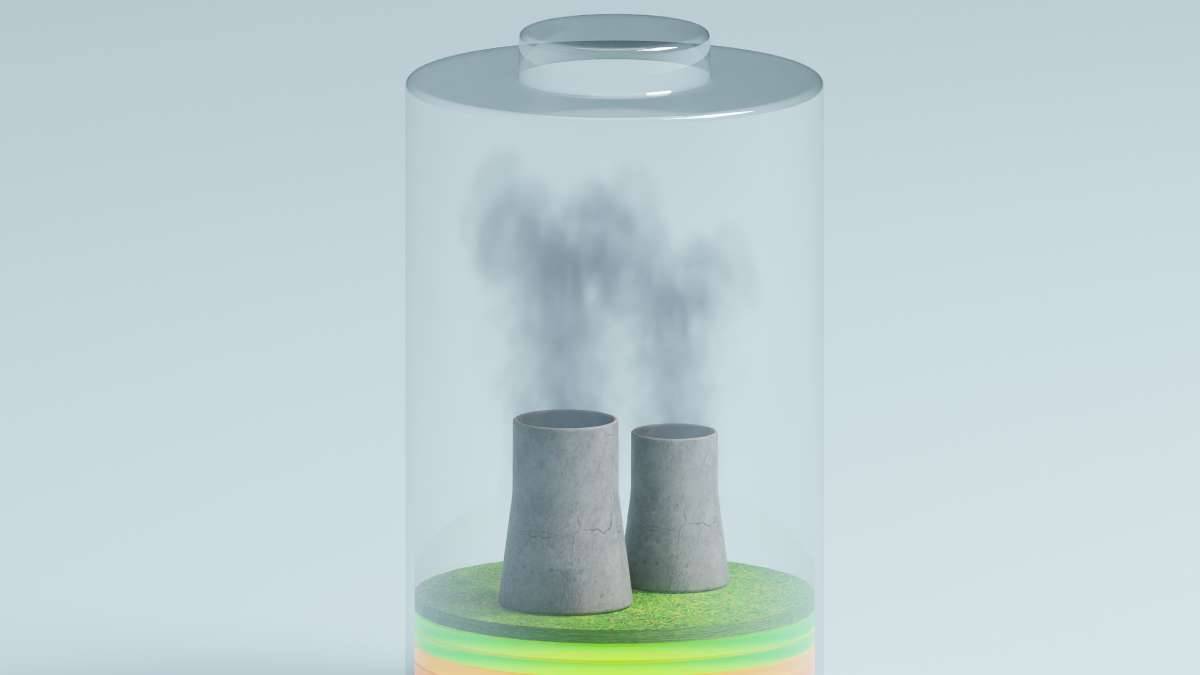
Debate on Nuclear Energy
ARTICLES | Nov 23, 2022
Writer: Nuttawut Kulkaew
Editor: Wittaya Wonglor
Nuclear fusion creates energy from lighter atoms combining into heavier atoms, such as two isotopes of hydrogen: deuterium and tritium forming an atom of helium as in the sun. Nuclear fusion is expected to be the future of energy security because hydrogen is a prevalent energy source. Hydrogen nuclear fusion could create 10 million times the power of fossil fuels at $0.03 per kilowatt/hour. FutureTales Lab expects 2041-50 to see household security in food, water, energy, and waste management. From 2061 humankind may start space colonization. The world aims to reduce fossil fuel consumption to zero by 2050, with nuclear power 14% of global electricity generation by then.
But decades of efforts by many countries to create an "Artificial Sun" are still at the research and development stage. The innovation is not expected to be ready to use before 2050.
Nuclear fission, where a giant atom like uranium breaks down into smaller atoms, requires more energy than nuclear fusion and creates non-stable and hazardous radioactive waste. China is heading toward nuclear energy on both sides, researching fusion and building fission plants. Japan is about to reoperate nuclear utility plants. The European Union is developing a simulated nuclear fusion artificial sun. Many countries across Europe also clearly have plans to continue and increase the number of fission reactors, such as France, Belgium, Poland, Romania, and the United Kingdom. The energy security crisis from the Ukraine-Russia war has accelerated their plans. Countries using nuclear power for the first time in 2020 include Belarus and the United Arab Emirates. For Thailand, nuclear power is mainly used for medical, industrial, and agricultural purposes. But it is also beginning a project to develop its artificial sun as an alternative energy and economic advance from 2023.
Building a nuclear power plant faces many frictions and pressures in terms of society, technology, economy, environment, politics, law, and people's values. The main reasons may be divided into four groups. (1) The issue of system management and technology within the factory is complex and sensitive to weather. There must be a coolant system. The factory may also have to slow down production on hot days. (2) The economic and environmental recompense for investing in nuclear power plants takes an average of 5 - 8.5 years. In operation, the utility costs 112 - 189 USD per MWh in producing energy compared to wind power costing 29 - 56 US dollars per megawatt hour. The solar energy costs 36 - 44 US dollars per megawatt hour. It is not to be mentioned that wind and solar energy are now safe mainstream options for alternative energy. The crucial point to discuss is that while nuclear fusion research is not yet budget-stable, the fuel cycle in nuclear fission plants generates vast amounts of radioactive waste that are difficult to dispose of. (3) It is undeniable that nuclear power plants are the first easy targets for terrorist operations and cyber-attacks. It is a vulnerable location in times of military conflict and war. Moreover, practical actions that not followed the code of conduct may lead to inevitable harm. (4) The conflict between the public and NGOs towards establishing nuclear power plants, especially the history of nuclear war and nuclear power plant explosions.
While the debate on nuclear energy is still ongoing, some countries may still expand nuclear power plant capacity. However, there are countries closing nuclear plants as well. Austria, Denmark, Germany, Luxembourg, and Spain are opposed to investing in nuclear energy. Taiwan is shutting down nuclear utilities from 2021 - 2025. Some activists demand that financial and investment institutions separate nuclear energy investments from sustainable investment lists.
Implications for the future:
- The government's investment in alternative energy at the national level should invest in a variety of alternatives according to the context of the area and economic viability to allocate a portfolio of domestic energy sources.
- Decisions to invest in domestic nuclear power will be another essential factor in the future of alliances and international cooperation between countries and within regions.
- People worldwide will increasingly seek to use and invest in alternative energy beyond solar and wind, such as biomass, hydro, geothermal, and hydrogen.
- The ocean will become a strategic location for studying alternative energy sources while considering controversial debates about environmental impacts and local income generation.
Reference
- Nuclear Power in the World Today https://world-nuclear.org/information-library/current-and-future-generation/nuclear-power-in-the-world-today.aspx
- IAEA Projections for Nuclear Power Growth Increase for Second Year Amid Climate, Energy Security Concerns https://www.iaea.org/newscenter/pressreleases/iaea-projections-for-nuclear-power-growth-increase-for-second-year-amid-climate-energy-security-concerns
- The future of nuclear power https://www.power-technology.com/analysis/nuclear-projects-future-olkiluoto-hinkley-point/
- Peoples’ Perception towards Nuclear Energyhttps://doi.org/10.3390/en15124397
- สงครามยูเครน-ภาวะโลกร้อน จูงใจยุโรปหันมาใช้พลังงานนิวเคลียร์ https://www.voathai.com/a/ukraine-climate-goals-push-some-in-europe-to-reconsider-nuclear/6570372.html
- เหตุผล 6 ประการ ที่พลังงานนิวเคลียร์ไม่ใช่คำตอบของโลกที่ยั่งยืนและสันติสุข https://www.greenpeace.org/thailand/story/23434/climate-nuclear-6reasons-why-nuclear-is-not-the-way-to-green-and-peaceful-world/
- EGAT joined Thailand’s first “Artificial Sun” project, a promising clean energy source https://www.egat.co.th/home/en/20220228e/
- เกาะติดสถานการณ์ “พลังงานนิวเคลียร์” ในปัจจุบัน จีนมาแรงที่สุดในโลก https://www.salika.co/2021/10/05/nuclear-power-trend-china-and-global/
- สิ่งนี้กำลังมา…เครื่องปฏิกรณ์นิวเคลียร์องครักษ์ ตามแผนยุทธศาสตร์ชาติ 20 ปี https://waymagazine.org/nuclear-reactor/
- "ญี่ปุ่น" วางแผนกลับมาใช้พลังงานนิวเคลียร์ ตั้งเป้าพัฒนาโรงงานใหม่ https://www.moneyandbanking.co.th/article/news/japan-plan-factory-240865
- Japan taps industry to build safer, more secure nuclear energy future https://www.theregister.com/2022/09/29/mitsubishi_heavy_safer_nuclear_reactor/
- อนาคตของพลังงานนิวเคลียร์ในประเทศไทย? https://th.boell.org/en/2021/06/21/thai-nuclear-power
Want to know more about us? Click https://www.facebook.com/FutureTalesLABbyMQDC or follow at https://www.blockdit.com/futuretaleslab











